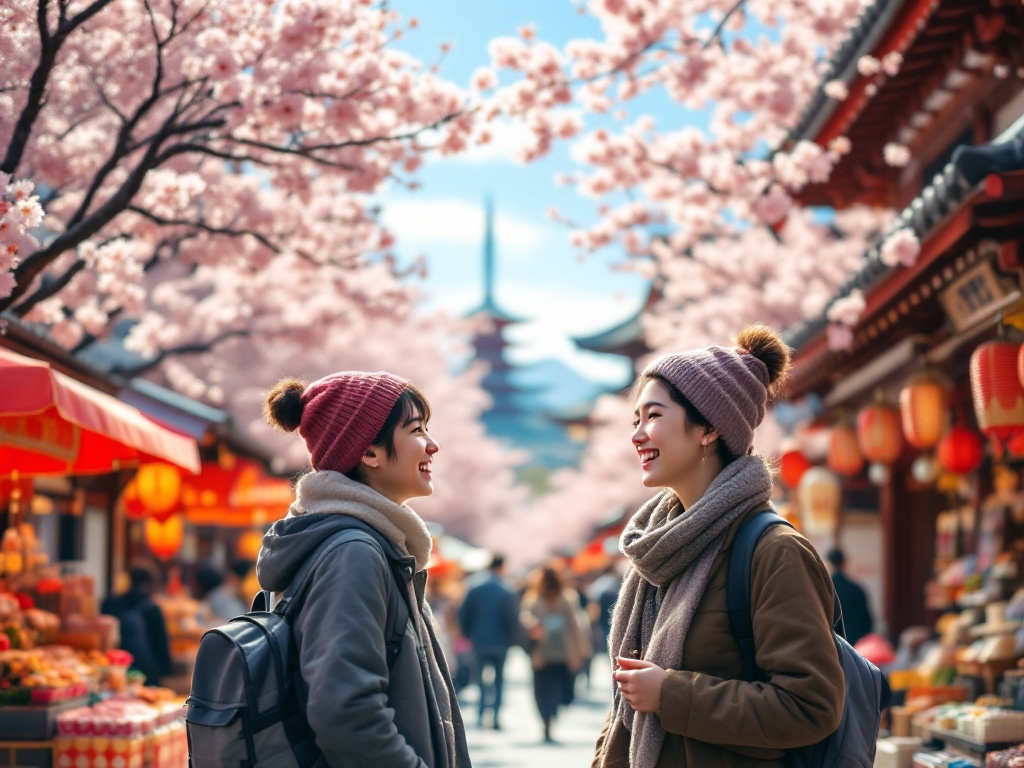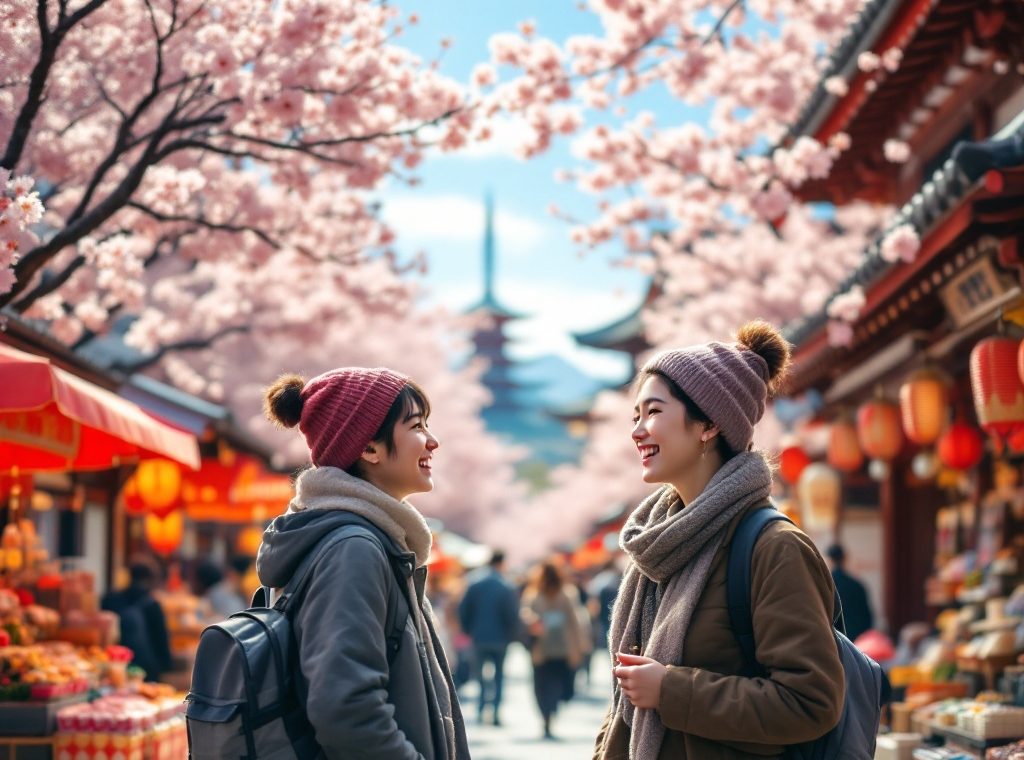What Are the Most Useful Japanese Phrases for Tourists? A Quick Guide
Planning a trip to Japan? Unlock a richer travel experience by learning basic Japanese phrases! From simple greetings like “Konnichiwa” to essential navigation phrases like “Koko ni ikitai desu” (I want to go here), this guide equips you with the language tools to navigate Japan with ease and respect. Discover how a few key phrases can break down language barriers, enhance your interactions with locals, and create a truly unforgettable cultural immersion. Start your Japanese language journey now and transform your next trip!
Important information

- Learning basic Japanese phrases improves your travel experience, showing respect and facilitating interactions with locals.
- Key phrases include greetings (“Konnichiwa,” “Arigatou”), directions (“Sumimasen, [Place] wa doko desu ka?”), and dining (“Menyū o kudasai,” “Kore o kudasai”).
- Using polite language (“kudasai,” “gozaimasu”) and honorifics (“-san”) is important for showing respect.
- Interactive phrasebooks and language learning apps are helpful tools for learning pronunciation and essential phrases.
- Even basic Japanese knowledge enhances cultural exchange and makes your trip more enjoyable.
Introduction to Useful Japanese Phrases for Tourists
Learning a few Japanese phrases can greatly enhance your trip to Japan. It not only breaks down language barriers, but also creates a much more immersive and rewarding experience. Even simple greetings like “Konnichiwa” (Hello) and “Arigatou” (Thank you) demonstrate respect and foster positive interactions with locals. Furthermore, useful phrases simplify everyday tasks, from navigating smoothly and ordering food with ease to confidently asking for directions. For example, try “Koko ni ikitai desu” (I want to go here) when lost, or present your ticket at the airport with “Chiketto o misete kudasai” (Please show your ticket). By learning basic Japanese, you’ll not only find your trip easier but also show a genuine appreciation for Japanese culture, creating a truly unforgettable experience.
Why Learning Japanese Phrases is Important for Tourists
Learning basic Japanese phrases can greatly enhance your travel experience. For example, a simple “Konnichiwa” (Hello) demonstrates respect and opens doors to positive interactions with locals. Expressing gratitude with “Arigatou gozaimasu” (Thank you) fosters cultural exchange. Using polite phrases also simplifies navigation, ordering food, and asking for help. This creates a richer and more rewarding travel experience.
Example phrases
- Konnichiwa (Hello).
- Arigatou gozaimasu (Thank you).
Benefits of using basic phrases
- Shows respect to locals.
- Creates positive interactions.
- Simplifies travel logistics.
- Leads to a more enriching experience.
How Japanese Phrases Overcome Language Barriers
Knowing a few basic Japanese phrases can greatly enhance your travel experience in Japan. These phrases can help you navigate everyday situations, such as asking for directions, ordering food, or simply expressing gratitude. Start with “Konnichiwa” (hello), which is a standard greeting. Express gratitude with “Arigatō” (thank you) to show appreciation for any assistance you receive. Use “Sumimasen” (excuse me) to get someone’s attention or apologize for any inconvenience. Even these simple phrases can bridge the communication gap and create positive interactions with locals.
Basic Greetings and Polite Expressions
Use “Konnichiwa” as a versatile greeting for hello.
Start your day with “Ohayou gozaimasu” to say good morning.
As evening approaches, transition to using “Konbanwa.”
Upon meeting someone new, extend a polite “Hajimemashite,” meaning nice to meet you.
Express gratitude with “Arigatou gozaimasu” to say thank you very much.
Use “Sumimasen” to say both excuse me and I’m sorry.
When making a request, add a courteous “Onegai shimasu” for please.
Common Greetings and Their Pronunciation
Use “Konnichiwa” (こんにちは) as a standard daytime greeting between 10 am and 6 pm.
Say “Ohayou gozaimasu” (おはようございます) as a morning greeting before 10 am.
Switch to “Konbanwa” (こんばんは) for evening greetings after 6 pm.
Use “Sayounara” (さようなら) to say goodbye.
Use “Hajimemashite” (はじめまして) when meeting someone for the first time, which means “Nice to meet you”.
Expressing Gratitude and Politeness
Expressing gratitude is essential in Japanese culture. “Arigatou gozaimasu” conveys deep appreciation.
While “arigatou gozaimasu” is more formal, a simple “arigatou” works well with friends.
Beyond thanks, “sumimasen” serves as both “excuse me” and “I’m sorry.”
These phrases are fundamental to polite Japanese conversation.
For first encounters, “hajimemashite” (nice to meet you) is customary.
To further strengthen connections, use “yoroshiku onegaishimasu,” which expresses your desire for a positive relationship.
Essential Phrases for Navigation and Directions
Asking for directions in Japanese is simpler than you might expect. Start by saying “Sumimasen” (excuse me). Then, state your destination and add “wa doko desu ka?” (where is it?). For example, to find Tokyo station, you would ask “Sumimasen, Tokyo eki wa doko desu ka?“.
Need further guidance?
Use the following phrases:
- “Kono michi o massugu itte kudasai” (please go straight on this road).
- On public transport, “Kippu o onegaishimasu” (one ticket, please).
- If you’re lost, “Eki wa doko desu ka?” (where is the station?).
Example
To ask for Tokyo Station, say: “Sumimasen, Tokyo eki wa doko desu ka?“
Asking for Directions in Japanese
Getting directions is easy. Politely ask, “Excuse me, where is [Place]?” which translates to “Sumimasen, [Place] wa doko desu ka?”.
Finding something nearby is simple. Ask, “Is there a [Place] near here?” The Japanese equivalent is “Kono chikaku ni [Place] wa arimasu ka?”.
Replace “[Place]” with specific locations. Use words like “eki” (station), “konbini” (convenience store), or “resutoran” (restaurant).
Express your destination clearly. Use “______ e ikitai desu,” meaning “I want to go to ______.” For example, say “Tokyo Station e ikitai desu” to express “I want to go to Tokyo Station.”
Transportation Phrases: Navigating Public Transport
On a bus, ask “Kono basu wa … ni ikimasu ka?” (Does this bus go to …?).
To find the train station, ask “Eki wa doko desu ka?” (Where is the train station?).
At the ticket counter, say “Kippu o onegaishimasu” (A ticket, please).
In a taxi, tell the driver your destination with “Kono jyusho made tsureteitte kudasai” (Take me to this address, please).
Remember to ask “Ryoukin wa ikura desu ka?” (What is the fare?).
Upon reaching your destination, say “Koko de tomatte kudasai” (Stop here, please).
Dining and Restaurant Phrases
Start by asking for the menu. Use the phrase “Menyū o kudasai“.
To order a dish you like, point at it and say “Kore o kudasai“.
After your meal, express your thanks by saying “Gochisousama deshita“. This is a polite way to show appreciation.
When you’re ready to pay, politely request the bill with “Okaikei o onegaishimasu“.
Ordering Food and Drinks in Japanese
Ordering food and drinks in Japan is easy. To order food, simply point at the item you want and say “Kore o kudasai,” which means “I’ll have this.” If you’d like to see the menu first, you can ask for it by saying “Menyu o kudasai.” Ordering drinks follows the same process. Point to your desired beverage and say “Kore o kudasai.” If you need a dedicated drinks menu, ask for “Nomimono menyu o kudasai.”
Understanding Japanese Restaurant Etiquette
Begin your meal by saying “Itadakimasu,” a phrase that conveys thanks for the provided food.
After finishing, express your appreciation with “Gochisousama deshita.”
Use phrases like “Sumimasen” (excuse me) and “Arigato gozaimasu” (thank you) to demonstrate respect.
Never stick your chopsticks upright in a bowl of rice, as this is considered rude. Instead, rest them on the provided chopstick rest.
When you’re ready to leave, use the phrase “Okaikei wo onegaishimasu” to request the bill.
Shopping and Convenience Store Phrases
Shopping Phrases
- Requesting an item: “[Item] o kudasai” (I would like [item]).
- Asking the price: “Kore wa ikura des ka?” (How much does this cost?).
- Locating the restroom: “Toire wa arimas ka?” (Where is the restroom?).
Convenience Store Etiquette
- Greetings: Greet staff upon entering and leaving.
- Payment: Place money on the tray, not directly in the cashier’s hand.
- Consuming purchases: Finish snacks and drinks outside the store.
- Waste disposal: Use designated bins for trash.
Common Shopping Phrases
Planning a shopping spree in Japan? A few handy phrases can make your experience much smoother.
“Ikura desu ka?” means “How much is this?”.
“[Item] o kudasai” means “I would like [item]”. For instance, “ringo o kudasai” means “I would like an apple”. Simply swap “ringo” for any desired item.
“Kore wa ikura desu ka?” also means “How much is this?”, but specifically refers to an item you’re pointing at.
These simple phrases will undoubtedly enhance your Japanese shopping adventures.
Convenience Store Manners in Japan
To get an employee’s attention, say “Sumimasen” (Excuse me).
If you need assistance, use “Sumimasen” again.
Express your gratitude with “Arigatou gozaimasu” (Thank you).
These courtesies foster respectful communication and enhance your shopping experience.
Asking for Help and Emergency Phrases
Traveling in Japan? Knowing a few key Japanese phrases can be invaluable.
Emergency Phrases
- In emergencies, shout “Tasukete!”, which means “help!”.
- For a more polite request, use “Tasukete kudasai,” meaning “please help me”.
Asking for Directions
If you get lost, ask “[Location] wa doko desu ka?” which translates to “Where is [location]?”. For example, asking “Tokyo Station wa doko desu ka?” will help you find Tokyo Station.
Medical Phrases
- Knowing how to say “Byoin” (hospital) is crucial in a medical emergency.
- If you’re in pain, say “Itai desu” to communicate your discomfort.
With these phrases, you’ll be better prepared for your Japanese adventure.
Common Phrases for Asking for Assistance
In emergencies, use “Tasukete kudasai!” meaning “Please help me!“. If you’re lost, ask “[Location] wa doko desu ka?” meaning “Where is [location]?“.
- To politely get someone’s attention, say “Sumimasen” which translates to “Excuse me“,
- Need an English speaker? Try asking “Eigo o hanasemasu ka?” meaning “Do you speak English?“,
- Another way to request assistance is “Tasukete moraemasuka?“, or “Can you help me?“.
Here’s a quick guide to essential Japanese phrases:
- Emergency: Tasukete kudasai! (Please help me!),
- Asking for directions: [Location] wa doko desu ka? (Where is [location]?),
- Getting attention: Sumimasen (Excuse me),
- Finding an English speaker: Eigo o hanasemasu ka? (Do you speak English?),
- Requesting help: Tasukete moraemasuka? (Can you help me?).
Emergency Situations: What to Say
If you need immediate assistance, shout “Tasukete kudasai!” meaning “Help me, please!“.
For police emergencies, yell “Keisatsu o yonde kudasai!” which translates to “Please call the police.“.
Should you require an ambulance, use “Kyuukyuusha o yonde kudasai,” meaning “Please call an ambulance.“.
If you’re lost, try “Michi ni mayoimashita,” or simply, “I’m lost.“.
Making Friends and Social Interactions
Use standard greetings. Examples include “Ogenki desu ka?” (How are you?) or “O-namae wa nan desu ka?” (What is your name?).
Inquire about their origins. A simple “Doko kara kimashita ka?” (Where are you from?) can be effective.
Use polite phrases. Sprinkle in phrases like “Sumimasen” (Excuse me), “Arigatou gozaimasu” (Thank you), and “Onegai shimasu” (Please).
Show interest in Japanese culture. Ask about local customs or try speaking a few Japanese words.
Basic Conversation Starters
Start a conversation by asking “Anata no namae wa nan desu ka?”. This means “What is your name?”.
Follow up with introductions using “Kochira wa donata desu ka?”. This translates to “Who is this?”.
Show genuine interest by asking “Ogenki desu ka?”. This means “How are you?”.
To learn more about their background, ask “Doko kara kimashita ka?”. This translates to “Where are you from?”. This question can lead to interesting travel conversations.
Finally, ask about their experience in Japan with “Nihon wa hajimete desu ka?”. This means “Is this your first time in Japan?”.
Impressing Locals with Simple Phrases
Showing appreciation in Japanese goes beyond the basics like “Arigatō gozaimasu” (thank you), “Konnichiwa” (hello), and “Sumimasen” (excuse me). While these are essential for polite interaction, using phrases like “Oishii” (delicious) when savoring a meal or “Kirei” (beautiful) to express admiration can significantly enhance your communication. These small gestures demonstrate respect for Japanese culture and create stronger connections with locals. They show that you’re not just a visitor, but someone genuinely engaged with the culture.
Interactive Language Lessons and Pronunciation Tips
Interactive phrasebooks offer a fun, engaging way to learn practical Japanese. Good pronunciation is crucial for comprehension, so tourists can hone their skills with interactive lessons and audio guides. Language learning apps are also valuable tools, often providing pronunciation feedback to help learners refine their spoken Japanese. Accurate pronunciation is essential for clear communication with native speakers. This makes interactions, such as ordering food or asking for directions, much smoother. Moreover, it fosters stronger connections with locals. Even if you’re not fluent, don’t hesitate to try; every effort counts.
Interactive Phrasebook for Tourists
Interactive phrasebooks are invaluable resources for anyone traveling to Japan, offering easy access to essential Japanese phrases. Tourists can utilize these handy tools for various situations, from navigating the bustling streets of Tokyo to enjoying a traditional Japanese meal or shopping for unique souvenirs. For instance, most phrasebooks include pronunciations for common greetings such as “Hello” (Konnichiwa), along with helpful phrases like “Thank you” (Arigatō gozaimasu), “Excuse me” (Sumimasen), and “I don’t understand” (Wakarimasen). By facilitating communication, these tools foster cultural exchange and bridge the gap between tourists and locals.
Tips for Correct Pronunciation
Mastering Japanese pronunciation involves mimicking native speakers. Leverage audio resources like language learning apps and online dictionaries to discern subtle sound nuances crucial for clear communication. For instance, the often-silent “u” in “desu” still influences the phrase’s overall sound. Accurate pronunciation not only ensures comprehension, but also demonstrates respect for the language. Here’s a structured approach to improve your Japanese pronunciation:
Start with the basics. Focus on mastering the five vowel sounds (a, i, u, e, o) and the basic consonant sounds.
Pay attention to pitch accent. Japanese is a pitch-accent language, meaning that the pitch of your voice can change the meaning of a word. Use online resources to learn the correct pitch patterns.
Mimic native speakers. Listen to audio recordings of native speakers and try to imitate their pronunciation as closely as possible.
Practice regularly. Consistent practice is essential for improving your pronunciation.
Record yourself. Recording yourself speaking Japanese can help you identify areas where you need to improve.
Travel Tips for Using Japanese Phrases Effectively
Traveling to Japan? Enhance your experience by learning these essential phrases:
Sumimasen (Excuse me):, this versatile phrase is useful for getting attention, apologizing, or making your way through crowds.
Arigatou (Thank you):, express gratitude with this simple yet powerful word.
Eigo o hanasemasu ka? (Do you speak English?):, use this phrase to find English speakers if needed.
Konnichiwa (Hello):, a friendly greeting to start any interaction.
Eki wa doko desu ka? (Where is the station?):, essential for navigating and finding your way.
Kono jyusho made tsureteitte kudasai (Take me to this address, please):, helpful when using taxis or ride-sharing services.
Remember these tips for smoother communication:
- Politeness and formality are valued in Japanese culture, using “kudasai” (please) and “gozaimasu” demonstrates respect.
- Overly casual language can be perceived as rude, so be mindful of your tone.
- Understanding honorifics can greatly improve your interactions.
Even a few basic phrases can significantly enhance your trip, making it more enjoyable and culturally enriching.
Travel Vocabulary Essentials
Learning key travel phrases can significantly enhance your trip. They help you navigate unfamiliar situations, from booking accommodations and getting directions to ordering meals and handling emergencies. For instance, knowing how to ask “Where is the restroom?” or “How much does this cost?” can prove invaluable. In a crisis, a phrase like “I need a doctor” can be crucial. Such simple phrases facilitate communication and enrich your travel experience. Tourists who learn basic local phrases report greater satisfaction and enjoyment. A little effort to learn a few key phrases yields significant rewards.
Balancing Politeness and Formality
In Japan, politeness and formality are deeply intertwined. Using honorifics such as “-san,” much like “Mr.” or “Ms.” in English, conveys respect. Formal settings, like business meetings or conversations with elders, require polite language (keigo).
Casual language is perfectly acceptable among friends and family. Observing Japanese customs is crucial for visitors. For instance, bowing upon greeting someone demonstrates respect. These nuances not only enhance communication but also show cultural sensitivity, making a significant difference in one’s interactions.
















